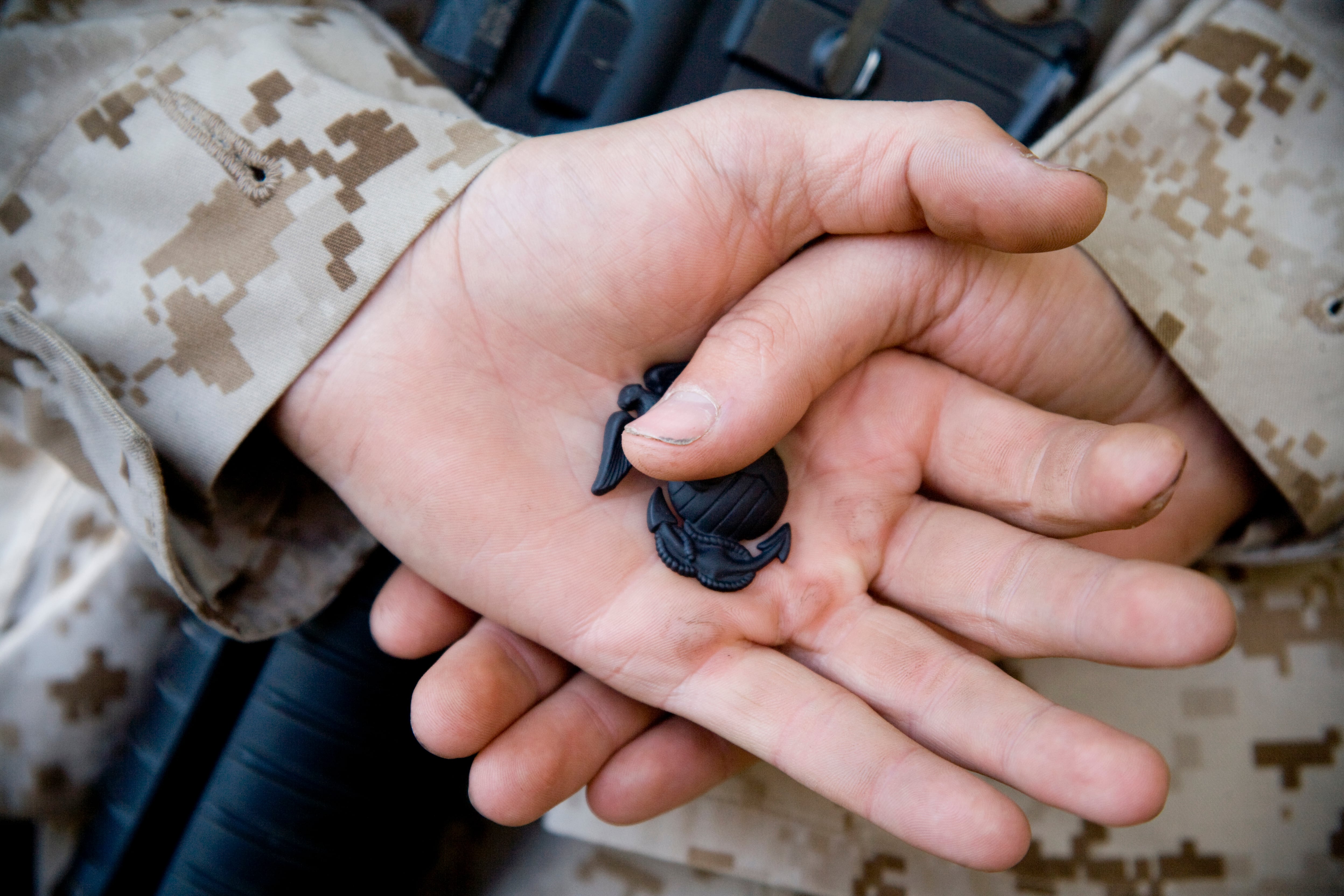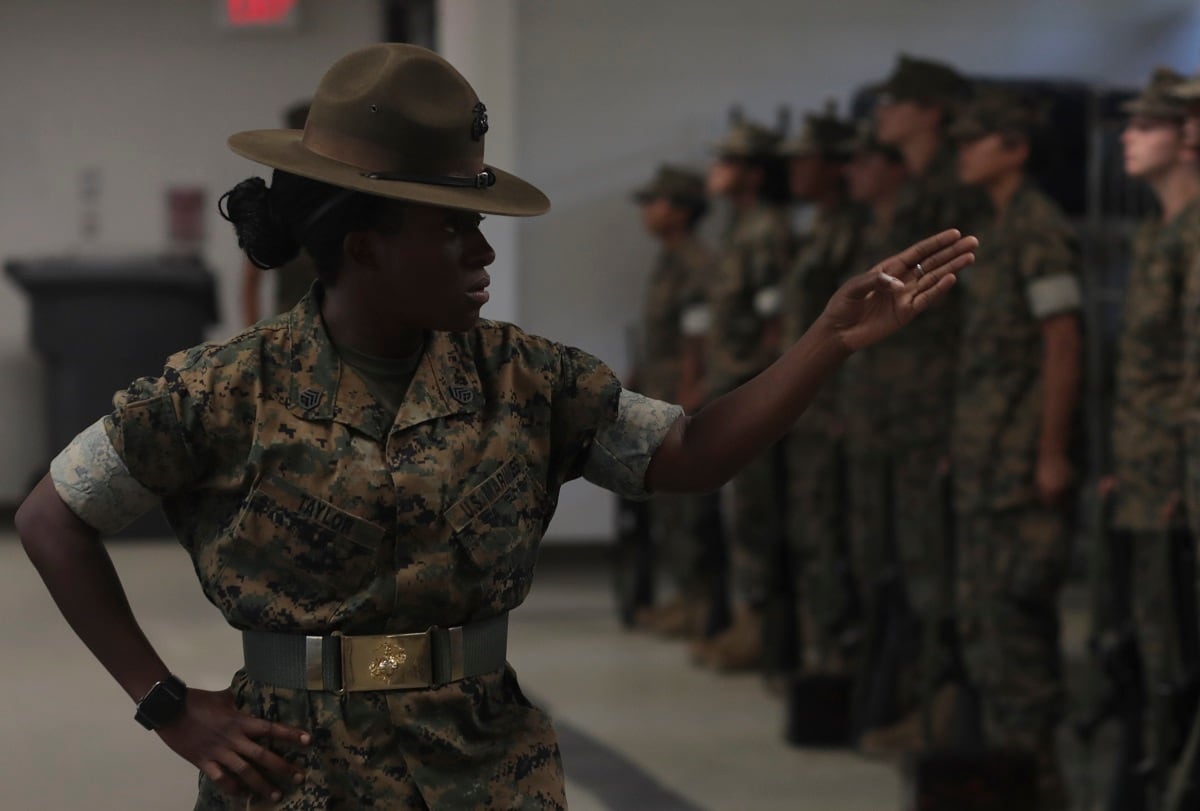When Lt. Gen. Kevin Iiams, commander of Marine Corps Training and Education Command, opened a draft version of a Marine Corps-commissioned report on boot camp gender integration in spring 2021, he was incensed at what he found.
Inside the University of Pittsburgh report ― which ultimately would stretch to more than 700 pages and cover topics ranging from recruits’ injury rates to boot camp staffing challenges ― one annex grabbed Iiams’ attention. It detailed all the “sexually demeaning and gender-based language” described by drill instructors and recruits in focus groups the university had run.
Within days, Iiams hit the road, making back-to-back trips to Marine Corps Recruit Depots Parris Island, South Carolina, and San Diego to address staff and drill instructors directly.
“My assessment at that point was, this is not something that could actually wait,” Iiams told Marine Corps Times in an end of September interview. “There was no way that we could have let this go on, if this was actually still festering.”
The independent study was commissioned in 2020 as the Marine Corps faced a directive from Congress to make boot camp training fully coed at both Marine Corps recruit depots within eight years.
University of Pittsburgh’s Neuromuscular Research Laboratory and Warrior Human Performance Research Center was tasked, under a $2 million contract, to “analyze combinations of gender-integrated training and make recommendations for models that integrate genders to the greatest extent possible while continuing to train Marines to established standards,” the service announced at the time. Marine Corps Times obtained the study, completed in June, through a public records request.
RELATED

Compared to the boot camp environment of a few decades ago portrayed in films like “Full Metal Jacket,” the language highlighted in the report was not particularly shocking.
But it represented a culture and mindset that Iiams says has no place in today’s Marine Corps.
Despite what may have happened in the past, he said, language like this violates the official recruit training order and fails to meet the service’s standard of treating all recruits with equal dignity.
The Marine Corps, the service with the youngest average age and the lowest percentage of female members, also has long had the highest reported rates of sexual assault. In fiscal 2021, 13.4% of female Marines reported experiencing unwanted sexual contact.
‘We’re all males’
During the two-year period that University of Pittsburgh investigators spent at the two recruit depots, unnamed interviewees described how sexually derogatory and explicit language was used by drill instructors to build rapport with recruits ― an approach specific to the all-male training environment the Corps is increasingly leaving behind.
“The way I loosen them up, I sometimes say like sexual stuff ‘cause we’re all males, just to break the ice,” a San Diego-based male senior drill instructor told an interviewer.
When teaching recruits how to drill, he said he instructed them to face forward, but use peripheral vision to remain aware of their surroundings. He described giving recruits the example of going to the mall with their girlfriend and watching another woman with large breasts walk by.
“You don’t want to get caught,” the senior drill instructor said. “You’re not going to turn your head, right? You use your fricking (we call it) titty vision. ‘Ahh, yes, sir!’ They get all excited.”
The senior drill instructor went on to describe sexual ditties used at boot camp and at Weapons and Field Training Battalion that had to be amended when women joined the unit.
Despite acknowledgements in the interview that he wasn’t supposed to be using this kind of language around recruits, the drill instructor appeared to defend the practice as a way to create a closer bond with recruits.
“They got to giggle and get excited when you walk about stuff like that,” he said. “And it’s just the way for you to buy into them.”
Other examples of demeaning and sexual language highlighted in the report included recruits being instructed to “reach up the skirt” and “smack that whore” or “smack that bitch” in rifle drills.
“They say that the M-16 is your bitch, and to slap it as hard as you like,” a recently graduated new Marine told University of Pittsburgh interviewers. “I was in a working party … and they asked us what we named our rifles, and one recruit named it after a porn star. Everyone thought that was awesome.”
For female drill instructors and recruits, anecdotes of demeaning language took other forms.
RELATED

A newly graduated female Marine told investigators that her female drill instructors had warned her that if she talked to male recruits, the drill instructors “are going to call you a slut.”
Female drill instructors and staff members talked about the way their mindset had been influenced by being told by instructors during their own early training that they’d be seen as either “a bitch, a slut or a lesbian” in the fleet, and they should choose which stereotype they wanted to confirm to.
The study did not state that female recruits were being given the same advice today, but new female Marines did say that drill instructors warned them that they’d face belittlement and negativity from their male peers.
One female training cadre member said she felt this unnecessarily damaged women’s perception of their service and their male counterparts from the outset.
“We just got to stop doing that to ourselves,” she said. “I hope we’re getting better at that. I hope that’s gone away.”
‘Not a leadership tool’
Iiams, who made the emergency trip to the recruit depots with his senior enlisted adviser, Sgt. Maj. Peter Siaw, said he was “somewhat reassured” in his conversations with leaders that they already have been moving to police the language and behavior described in the draft report by reinforcing the standards drill instructors are expected to meet and the regulations governing training.
While Iiams said he did not take any actions to determine the identities of the interviewees in the University of Pittsburgh report or push for discipline, he confronted the notion that the coarse joking was an important part of building rapport between drill instructor and recruit.
“Demeaning and degrading language is not a leadership tool right now,” he said. “And that’s what we have to continue to reiterate ― that that is not part of how we train our Marines. The salty language, while that might have been something they smiled at or grinned at in some other realm, that’s not what we do as part of the Marine Corps.”
Until 2019, Marine Corps recruit training was entirely gender-segregated, with the Parris Island, South Carolina, 4th Recruit Training Battalion the only unit training female recruits.
Since then, the Corps has begun training gender-integrated companies in its efforts to comply with the congressional mandate.
RELATED

Marine Corps leaders say they already have independently implemented many of the University of Pittsburgh study’s 18 recommendations and now are considering the others. Major proposals include gender-integrated drill instructor teams and integrating training at the platoon level.
Leaders, including Iiams, still maintain there’s value in keeping the genders separate in platoons, saying it’s key to the way the Corps builds Marines.
But the service is increasingly under pressure from Congress and critics who say that gender-separated training at any level creates harmful divisions and stereotypes.
It’s not clear when the Marine Corps will make decisions about the University of Pittsburgh study’s remaining recommendations.





